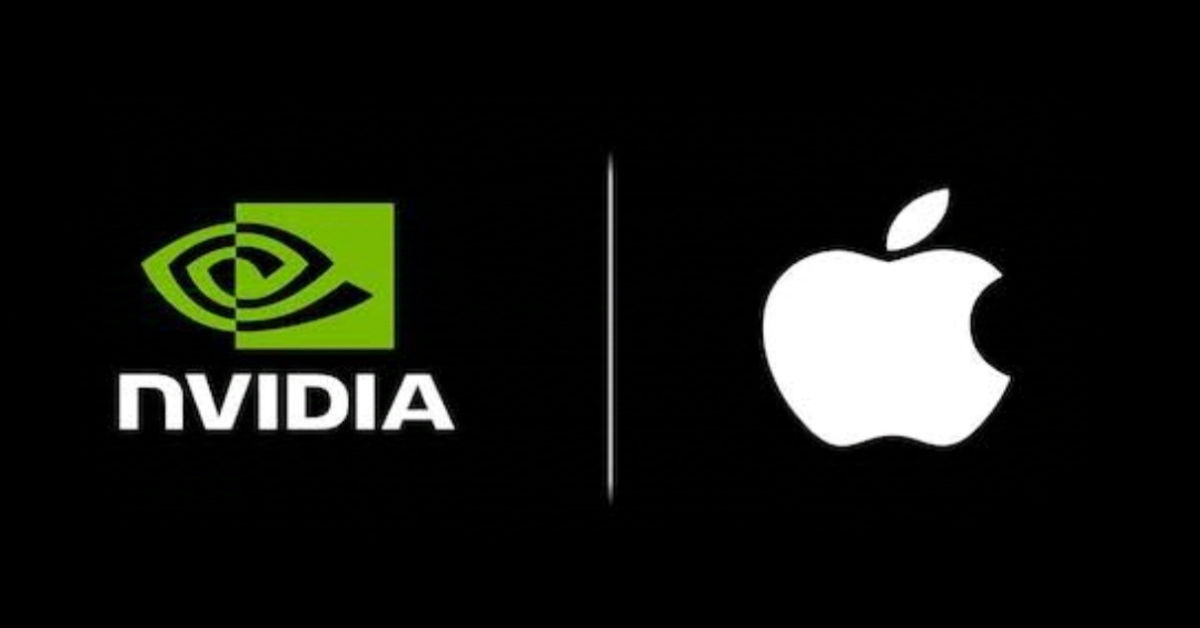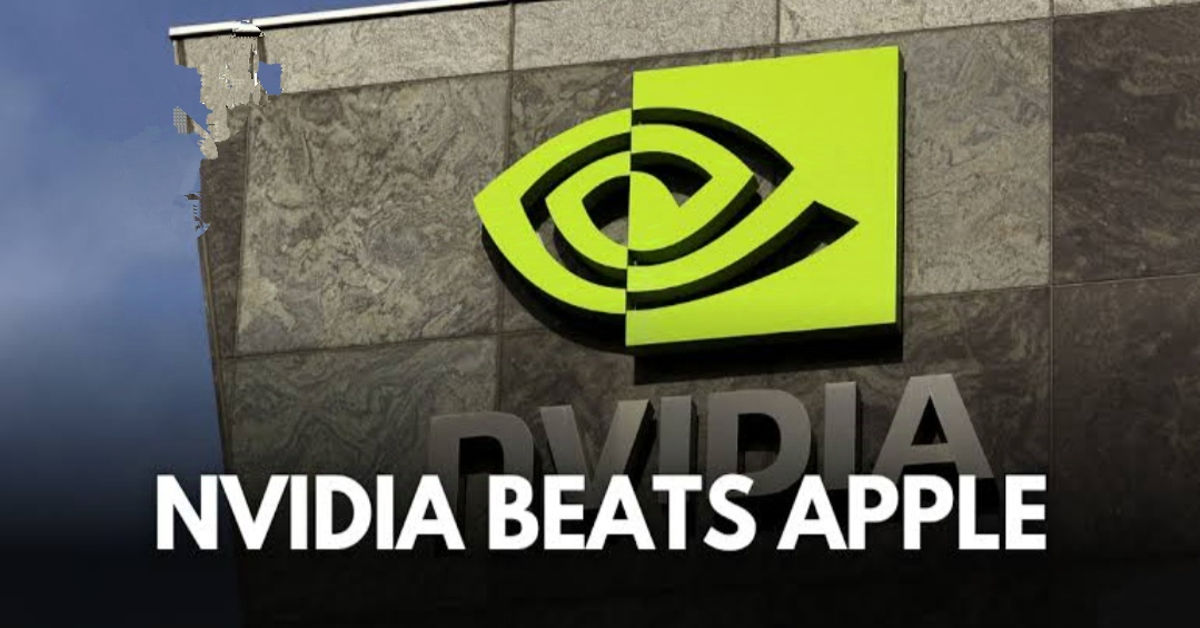Table of Contents
ToggleThe Rise of Nvidia: Becoming the World’s Most Valuable Company.
In a surprising twist in the tech industry, Nvidia has officially surpassed Apple to become the world’s most valuable company, achieving a market capitalization of $3.53 trillion compared to Apple’s $3.52 trillion, according to recent data from LSEG. This milestone marks a significant shift in the technology landscape, highlighting the rapidly evolving dynamics of the market, where innovation, demand for AI technologies, and shifts in consumer preferences are playing a crucial role. This essay will explore the factors contributing to Nvidia’s remarkable ascent, the implications of this change, and what it means for the future of technology and investment.

Nvidia’s Transformation and Core Business
Founded in 1993, Nvidia began as a manufacturer of graphics processing units (GPUs) primarily for gaming. However, over the years, the company has undergone a significant transformation, diversifying its offerings and entering multiple markets. Today, Nvidia is recognized not only for its gaming GPUs but also for its leadership in artificial intelligence (AI) and data center solutions.
The AI Revolution
The rise of AI has been a game-changer for Nvidia. With the increasing demand for AI-powered applications and technologies, the need for high-performance computing has skyrocketed. Nvidia’s GPUs are uniquely suited for parallel processing tasks, which are essential for training complex AI models. This has led to an explosion in demand for their products across various sectors, including healthcare, automotive, and finance.
Nvidia’s introduction of the CUDA programming model in 2006 was pivotal. CUDA allowed developers to leverage the parallel processing power of GPUs for general-purpose computing tasks, enabling a range of applications beyond gaming. As AI gained traction in recent years, Nvidia’s role in powering AI innovations became more pronounced. The company’s data centers are now integral to many businesses’ operations, further cementing its position in the tech ecosystem.
Strategic Partnerships and Ecosystem Development
Nvidia has also been successful in forming strategic partnerships that enhance its value proposition. Collaborations with major players like Microsoft, Google, and Amazon Web Services (AWS) have expanded Nvidia’s reach and facilitated the integration of its technology into various platforms. For instance, Microsoft’s Azure cloud services leverage Nvidia’s GPUs to provide customers with robust AI capabilities. These partnerships not only boost sales but also position Nvidia as a key enabler of future innovations.
Moreover, Nvidia’s investment in software development has created an ecosystem around its hardware. The launch of the Nvidia Omniverse, a platform designed for 3D simulation and collaboration, is an example of how the company is diversifying its offerings. This platform attracts developers and creators, fostering a community that builds applications on Nvidia’s technology, which in turn drives hardware sales.

Read This Post also : The Merger of JioCinema and Disney+ Hotstar.
Financial Performance and Market Position
Nvidia’s financial performance reflects its successful transition and market leadership. The company’s revenues have soared, particularly in recent quarters. In Q2 2023 alone, Nvidia reported revenues exceeding $13 billion, driven by robust demand for its AI chips. This growth trajectory has attracted investors, resulting in a significant increase in stock prices, which ultimately contributed to Nvidia surpassing Apple in market value.
Comparing Growth Trajectories
When examining Nvidia’s growth in contrast to Apple, it’s important to recognize the different drivers behind each company’s success. Apple has been a powerhouse in consumer electronics, with its iPhone and ecosystem of products generating substantial revenue. However, as the smartphone market matures, growth has slowed, leading to concerns about Apple’s long-term growth potential.
In contrast, Nvidia operates in a rapidly expanding market. The global AI market is projected to reach trillions in the coming years, driven by advancements in machine learning, natural language processing, and autonomous systems. As more industries adopt AI technologies, Nvidia stands to benefit significantly. This disparity in growth potential has led investors to favor Nvidia, contributing to its rise in market capitalization.
Implications for the Tech Industry
Nvidia’s ascension to the top spot has far-reaching implications for the tech industry and the broader economy.
The Shift in Investor Sentiment
Nvidia’s success underscores a shift in investor sentiment from traditional tech giants like Apple to companies that are leading the charge in transformative technologies. Investors are increasingly seeking exposure to sectors poised for growth, such as AI, cloud computing, and advanced data analytics. As Nvidia demonstrates, the ability to innovate and adapt to changing market demands can yield substantial financial rewards.
Competitive Landscape
Nvidia’s rise may also intensify competition among tech companies. Major players like AMD, Intel, and Google are investing heavily in AI and data center solutions to capture market share. The increasing focus on AI could lead to rapid advancements in technology, with companies racing to develop the next breakthrough innovation. This competitive pressure can drive overall industry growth, benefiting consumers and businesses alike.
Challenges Ahead
Despite its current success, Nvidia faces challenges. Supply chain disruptions, semiconductor shortages, and geopolitical tensions can impact production and distribution. Moreover, the rapid pace of technological advancement means that today’s leaders must continuously innovate to maintain their position. Nvidia’s ability to stay ahead of the curve will be crucial for its sustained success.
The Future of Nvidia and the Tech Landscape
As Nvidia continues to evolve, several factors will influence its trajectory. The company’s ongoing investment in research and development is critical. By focusing on next-generation technologies, such as quantum computing and advanced AI, Nvidia can maintain its competitive edge. Additionally, expanding into new markets, such as healthcare and automotive, will provide further growth opportunities.
Ethical Considerations in AI
As Nvidia plays a central role in the AI revolution, ethical considerations surrounding AI technologies will become increasingly important. Issues related to privacy, bias, and the impact of AI on jobs are gaining prominence. Nvidia must navigate these challenges responsibly, ensuring that its innovations contribute positively to society. Transparency and accountability will be key factors in building trust with consumers and regulators.
The Role of Regulation
The tech industry is under scrutiny from regulators worldwide, with concerns about monopolistic practices and the ethical implications of AI. Nvidia’s dominant position may attract regulatory attention, necessitating a proactive approach to compliance and cooperation with regulators. Engaging in dialogue with policymakers can help shape a balanced regulatory environment that fosters innovation while protecting public interests.

Conclusion
Nvidia’s rise to become the world’s most valuable company is a testament to its innovative spirit, strategic foresight, and adaptability in a rapidly changing market. As the company continues to lead in AI and high-performance computing, it is well-positioned to capitalize on the growing demand for these technologies. While challenges lie ahead, Nvidia’s commitment to innovation and ethical considerations will be critical for its sustained success. This milestone not only reshapes the competitive landscape but also serves as a reminder of the transformative potential of technology in our lives. The world will be watching closely as Nvidia navigates this new chapter, setting the stage for future innovations that could redefine industries and improve lives.

[…] Read This Post Also : The Rise of Nvidia: Becoming the World’s Most Valuable Company. […]